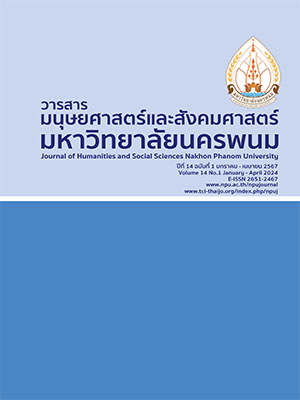The Effect of Extra-Curricular Activities on “Amazing Huakao” Based on Cooperative Learning Using STAD Technique with Boardgames on English Learning Achievement of Grade 1 Students
Main Article Content
Abstract
The purposes of this research were to compare the learning achievement of students in English before and after using the extra-curricular activities based on cooperative learning management by using the STAD technique with boardgames, to compare the learning achievement of students after using the extra-curricular activities based on cooperative learning management by using STAD technique with boardgames with the criteria of 70 percent, and to study students’ satisfaction toward the extra-curricular activities. The samples were 30 grade 1 students in a primary school in Songkhla province, the Songkhla primary education service area office 1, using cluster random sampling. The research instruments consisted of 1) lesson plans, 2) an English learning achievement test with a 0.86 reliability value, and 3) the student’s satisfaction questionnaire. The statistics used in the data analysis were mean, standard deviation, and t-test. The result showed that: 1) the posttest score of English learning achievement after using the extra-curricular activities based on cooperative learning management by using STAD technique with boardgames was significantly higher than the pre-test at the level of.01; 2) the posttest score of English learning achievement after using the extra-curricular activities based on cooperative learning management by using STAD technique with boardgames was significantly higher than the criteria of 70 percent at the level of.01; and 3) the students’ satisfaction toward the extra-curricular activities was at a higher level. This research has improved students' English learning achievement and satisfaction toward the activities, which will further affect the educational quality of the English subject.
Article Details

This work is licensed under a Creative Commons Attribution-NonCommercial-NoDerivatives 4.0 International License.
References
Apikeart, K. and Sarteankew, T. (2020). Kānsō̜n bǣp thansamai læ theknik withī sō̜n nǣo mai [Guide to Teaching Methods for Modern Day]. Retrieved October 2023, from https://regis.skru.ac.th/RegisWeb /webpage/addnews/data/2017-07-24_078.pdf
Buapan, P. (2022). Phon kānchai kitčhakam kēm kradān phư̄a songsœ̄m thaksa kān phūt phāsā Angkrit radap namat yom sưksā pī thī 1 [The effects of using board games to enhance English speaking skills of 7th grade students]. Journal of Education Silpakorn University. 20(2),230-241.
Culture and Natural Environment Management Bureau. (2023). Office of Natural Resources and Environmental Policy and Planning (ONEP). Retrieved July 2023, from https://naturalsite.onep.go. th/index.php/site/detail/755.
Foithong, K. (2010). Kānčhatkān rīan kānsō̜n bǣp būn nā kān rư̄ang lǣng rīanrū nai thō̜ngthin [The Local Learning Management]. Retrieved October 2023, from https://portal.in.th/English/pages/13204/-Cached
Gardner, H. (2009). Five Minds for the future. Boston : Harvard Business School
Intornsomjai, N. (2021). Kānchai kēm kham sap phāsā Angkrit phư̄a phatthanā khwāmsāmāt nai kān sakot kham læ čhotčham kham sap khō̜ng nak rīan namat yom sưksā pī thī 3 [Using Word Games for Development of English Vocabulary Learning of Grade 9 students]. Naraesuan University. 6(3),233-241.
Ministry of Education.(2008). Laksūt kǣn klāng kānsưksā Khanhư̄n thān [The Basic Education Core Curriculum]. Bangkok : Agricultural cooperative printing demonstrations of Thai, Ltd.
Mulkham, S. (2007). Konlayut kānsō̜n khit wikhro [Analytical Thinking]. Bangkok : Pappim.
National Institute of Educational Testing Service. (2019). Ordinary National Educational Test (O-NET) 2019. Retrieved January 2023, from http://www.newonetresult.niets.or.th/AnnouncementWeb/Login.aspx.
Sintapanon, S. (2015). Kānčhatkān rīanrū khō̜ng khrū yuk mai phư̄a phatthanā thaksa khō̜ng phū rīan nai satawat thī 21 [21st Century Skills: Learning Skills to become the Professional Teacher]. Bangkok : Technic Printing.
Slavin, R. E. (1987). Cooperative learning and the cooperative school, Educational leadership. 45(3),7-13. doi:10.4236/ce.2015.63039
Kanthasorn, M. (2021). Gaan pát-tá-naa bàep fèuk ták-sà gaan àan paa-săa ang-grìt dûuay grà-buuan gaan jàt gaan riian róo bàep nén paa-rá ngaan bpen tăan rûuam gàp ték-ník STAD săm-ràp nák riian chán mát-tá-yom sèuk-săa bpee têe sŏng [Development of English Reading Lesson through Task-Based Approach and STAD Technique for Grade Eighth students (Unpublished Doctoral Dissertation)]. Uttraradit University, Uttraradit, Thailand.
Kotwanit, T. (2003). jìt wít-tá-yaa tûua bpai [General Psychology]. Bangkok : Se-education Public Company Limited.
Khammani, T. (2020). Sāt kānsō̜n [The Science of Teaching]. Bangkok : Chulalongkorn University Press.
Tumtong, B. (2013). Thritsadī læ kānphatthanā rūpbǣp kānčhatkān rīanrū [Theories and development instructional model]. Bangkok : S.printing Factory Thailand.
Warunkul, S. (1999). Kit kan marūam laksūt [Co-curricular activities]. Curriculum and Instruction, Faculty of Education. Chiang Mai Rajabhat University.


